

Edvard Grieg. Edvard Grieg (1888) Edvard Hagerup Grieg (Norwegian: [ˈɛdʋɑrd ˈhɑːɡərʉp ˈɡrɪɡ]; 15 June 1843 – 4 September 1907) was a Norwegian composer and pianist.
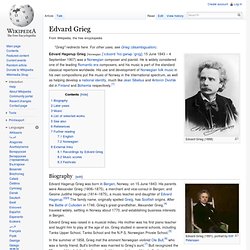
He is widely considered one of the leading Romantic era composers, and his music is part of the standard classical repertoire worldwide. His use and development of Norwegian folk music in his own compositions put the music of Norway in the international spectrum, as well as helping develop a national identity, much like Jean Sibelius and Antonín Dvořák did in Finland and Bohemia respectively.[1] Biography[edit] Edvard Grieg was raised in a musical milieu. In the summer of 1858, Grieg met the eminent Norwegian violinist Ole Bull,[6] who was a family friend; Bull's brother was married to Grieg's aunt.[7] Bull recognized the 15-year-old boy's talent and persuaded his parents to send him to the Leipzig Conservatory,[6] then directed by Ignaz Moscheles.
In 1863, Grieg went to Copenhagen, Denmark, and stayed there for three years. Edvard Grieg - Peer Gynt [complete recording] Edvard Grieg, In the Hall of the Mountain King from "Peer Gynt" Nikolai Rimsky-Korsakov. Portrait of Nikolai Rimsky-Korsakov in 1898 by Valentin Serov (detail) Rimsky-Korsakov believed, as did fellow composer Mily Balakirev and critic Vladimir Stasov, in developing a nationalistic style of classical music.
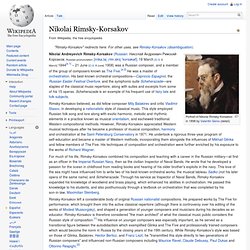
This style employed Russian folk song and lore along with exotic harmonic, melodic and rhythmic elements in a practice known as musical orientalism, and eschewed traditional Western compositional methods. However, Rimsky-Korsakov appreciated Western musical techniques after he became a professor of musical composition, harmony and orchestration at the Saint Petersburg Conservatory in 1871. Rimsky-Korsakov "Scheherazade" / "シェエラザード" 全曲(指揮映像) Rimsky Korsakov - Scheherazade. RIMSKY-KORSAKOV Flight of the BumbleBee. Francisco Tárrega. Francisco de Asís Tárrega y Eixea (21 November 1852 – 15 December 1909) was a Spanish composer and classical guitarist of the Romantic period.
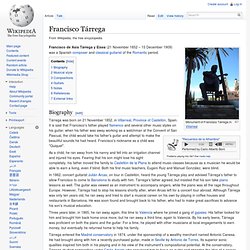
Biography[edit] Tárrega was born on 21 November 1852, in Villarreal, Province of Castellón, Spain. It is said that Francisco's father played flamenco and several other music styles on his guitar; when his father was away working as a watchman at the Convent of San Pascual, the child would take his father's guitar and attempt to make the beautiful sounds he had heard.
Francisco's nickname as a child was "Quiquet". As a child, he ran away from his nanny and fell into an irrigation channel and injured his eyes. In 1862, concert guitarist Julián Arcas, on tour in Castellón, heard the young Tárrega play and advised Tárrega's father to allow Francisco to come to Barcelona to study with him. Three years later, in 1865, he ran away again, this time to Valencia where he joined a gang of gypsies. "Danza Mora", sheet music. Francisco Tárrega - Grand Vals. "Capricho Arabe" played by Segovia. Giacomo Puccini. Giacomo Puccini Giacomo Puccini (Italian: [ˈdʒaːkomo putˈtʃiːni]; 22 December 1858 – 29 November 1924) was an Italian composer whose operas are among the important operas played as standards.
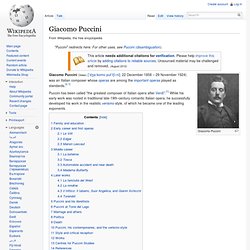
[n 1] Puccini has been called "the greatest composer of Italian opera after Verdi".[1] While his early work was rooted in traditional late-19th-century romantic Italian opera, he successfully developed his work in the realistic verismo style, of which he became one of the leading exponents. Family and education[edit] Puccini's birthplace, seen in 1984 Early career and first operas[edit] Puccini wrote an orchestral piece called the Capriccio sinfonica as a thesis composition for the Milan Conservatory. Le Villi[edit] After the premiere of the Capriccio sinfonica, Ponchielli and Puccini discussed the possibility that Puccini's next work might be an opera. Giacomo Puccini - O mio babbino caro. Puccini - Tosca (2011) Giacomo Puccini La Boheme. Puccini - Turandot (Levine). Antonín Dvořák. Antonín Dvořák Antonín Leopold Dvořák (/ˈdvɔrʒɑːk/ DVOR-zhahk or /dɨˈvɔrʒæk/ di-VOR-zhak; Czech: [ˈantoɲiːn ˈlɛopolt ˈdvor̝aːk] ( ); September 8, 1841 – May 1, 1904) was a Czech composer.
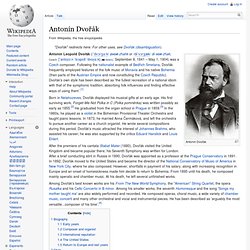
Following the nationalist example of Bedřich Smetana, Dvořák frequently employed features of the folk music of Moravia and his native Bohemia (then parts of the Austrian Empire and now constituting the Czech Republic). Dvořák's own style has been described as 'the fullest recreation of a national idiom with that of the symphonic tradition, absorbing folk influences and finding effective ways of using them'.[1] Born in Nelahozeves, Dvořák displayed his musical gifts at an early age. Biography[edit] Early years[edit] Dvořák was born in Nelahozeves, near Prague (then part of Bohemia in the Austrian Empire, now Czech Republic), the eldest son of František Dvořák (1814–1894) and his wife Anna, née Zdeňková (1820–1882).[5] František was an innkeeper, professional player of the zither, and a butcher. Dvorak: Humoresque. Antonin Dvorak - New World Symphony (Full) Pyotr Ilyich Tchaikovsky. Portrait of Pyotr Ilyich Tchaikovsky Pyotr Ilyich Tchaikovsky (/ˈpjɔːtər ɪˈliɪtʃ tʃɪˈkɒfski/; Russian: Пётр Ильи́ч Чайко́вский;[a 1] tr.
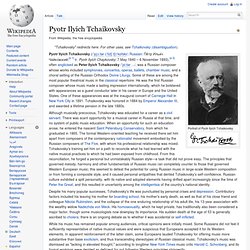
Pyotr Ilyich Chaykovsky; 7 May 1840 – 6 November 1893),[a 2] often anglicised as Peter Ilyich Tchaikovsky /ˈpiːtər .../, was a Russian composer whose works included symphonies, concertos, operas, ballets, chamber music, and a choral setting of the Russian Orthodox Divine Liturgy. Some of these are among the most popular theatrical music in the classical repertoire. He was the first Russian composer whose music made a lasting impression internationally, which he bolstered with appearances as a guest conductor later in his career in Europe and the United States.
One of these appearances was at the inaugural concert of Carnegie Hall in New York City in 1891. While his music has remained popular among audiences, critical opinions were initially mixed. Tchaikovsky - Piano Concerto 1 - B Flat Minor. P.I.Tchaikovsky - The Nutcracker. TCHAIKOVSKY: Swan Lake - Лебединое Озеро. Tchaikovsky - The Nutcracker (BBC Royal Opera House)